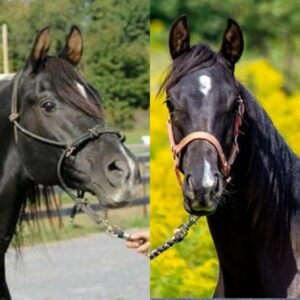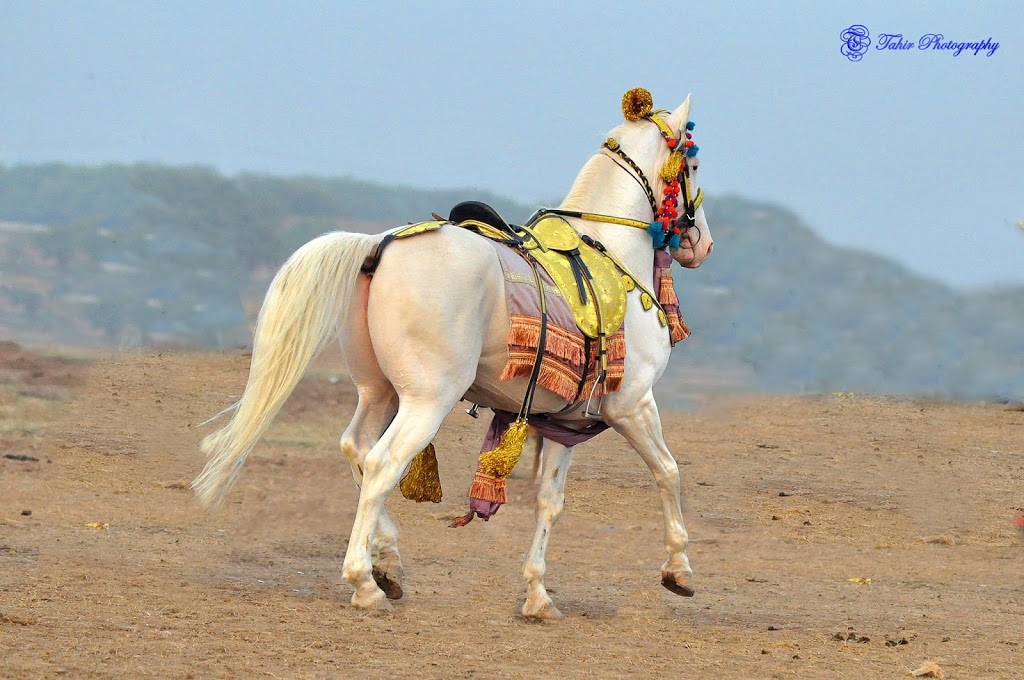Nasr – Learning To Hear Each Other
 |
This post is part of a series I am writing about training, or being trained by, 2 stallions. Nafis Rafiq “Rafi” is 24, a been-there-done-that wise protective smart patient stallion. Nasr Mubaarak “Nasr” is his yearling son, just as smart and wise as his daddy, with the curiosity of youth mixed in. Stallions in general aren’t part of the majority American horse culture. Most of us grew up riding geldings, or mares. Stallions are generally reserved for the breeding farms and experienced riders and trainers, and are often perceived as dangerous or difficult. Thank goodness my first stallion experiences have been with Rafi. I am figuring out much as I go along, finding a path that honors their conscious being, while also keeping me and other people and horses safe. I have been blessed to find some conscious horsemanship for stallions mentors in the books of Linda Kohanov and Klaus Hempfling and the teachings of Kim Walnes and her horse Gideon. Join me for the journey!
|

Somehow I just assumed that a young horse and I would “speak” to each other fluently and easily, like I share “language” with his sire and with the other herd members. I also felt a bit confused that Nasr and I didn’t seem to share a “language” the way I do with the rest of the herd.
I’m discovering that maybe it was just a matter of us growing into that common space.
Tonight was what I would consider our first real “discussion”.

We were hosting guests, and the guests were in the barn admiring the horses. When it came time for turnout, Nasr didn’t follow his mom out of the barn. I returned to find him investigating the tack area, muck barrow, and other interesting items scattered at the end of the barn. Everything with sniffed, prodded, nibbled on. I put his halter on (well, actually, his mom’s halter) but decided to allow the exploring, as he needs to develop his confidence about unfamiliar things. He then decided that he needed to investigate the guests. Both guests have some horse experience and were petting and scratching the good spots. Up until this point, he was being respectful of my requests but silent about feedback. That changed when I asked him to leave the guests and follow me out of the barn.
He remained facing the guests, but turned his focus and eye to me and quite clearly shared that they are interesting and pleasing and he would like to stay with them.
!!!!
Quite a few things ran through my mind at the same time. Whoa! My boy is talking to me! and… Do I let him stay? Or is it better to insist he obey? and… Ooof, I better not mess this up! and probably a few other thoughts that escape me now, as they were all happening on top of each other and I’m smiling at the guests and not mentioning that I’m HAVING MY FIRST DISCUSSION WITH NASR!!!! <insert huge smile> After a moment of consideration, I realized he was really asking quite politely and there was no harm or danger in allowing him to enjoy meeting them.
After a few minutes of mutual curiosity and admiration, I explained that I wanted to put him in with the herd, and pointed out that the herd was in the barn in their run-in, and that they could all observe and interact with the guests from there. OK, good, with just a reminder of body language and no lead pressure, he started to follow me. And then got distracted by his own halter hanging on the gate and had to stop to chew on it and play with it. After some play, and some quiet reminders of where I needed to take him, and a bit of body language to reinforce my request, he followed on a loose lead.

And then we hit our next snag, or what I will now call our next negotiation point. He saw no reason why he couldn’t stand with the herd but on the other side of the barrier. Why should he have to walk past them and leave them, in order to go through a gate and return to them? I explained where we needed to go, and admitted it was more walking, and that yes, I was also going to use the gate outside the barn, not the inside gate, which was even more walking. In hindsight, I probably could and should have explained that the inside gate is hard to unfasten (for guest safety) and that it is safer and easier for me to use the outside gates. But I didn’t. I just explained what I wanted, without the why, and ended up having to use a bit of halter pressure when he insisted that he was staying right there. After about 20 seconds of pressure, some stops and starts of a few steps, and some mental battling of wills, he yielded and followed me calmly on a slack lead.
Once through the gate and out of his halter, I indulged him in an all-over scratch, which led up to me being able to drape across his back and lean on his side while scratching his shoulders. I mentally sent him all my feelings of happiness and pride and pleasure at how wonderfully he did with that and left him to rejoin the rest of herd in the barn.
So wow! We just had our first “adult conversation” and negotiations over activities.
[Note: To clarify, these conversations are not words and sentences. They most closely fit the label of a series of knowings, like the feeling of a hunch, or a gut impression about a person or situation, but all strung together to form a coherent message. I tend to throw in mental images, in the hopes of being more clear, but notice that my horses typically do not unless its an emergency. One horse made it quite clear that I was “shouting” when I did too much of that, but I still tend to when I start doubting that I’m making my point. Also, there seem to be two versions of horse-speak: What a friend and mentor calls “old horse”, which is the more traditional sending by breath and intuition, and then what I might call “easy horse” which seems to be the way most communicate with the humans around them. So far, I have only met one horse that spoke “old horse” to me, and to others. I’m very curious to see if Nasr also speaks “old horse”.]
Postscript: After writing this I had one of those “duh” moments. Nasr speaks “old horse”. The problem was/is that I don’t share breath with Nasr like I do with Rafi because I don’t trust Nasr enough yet. He’s young, and still uses his teeth on occasion, and I’d prefer not to get my nose bitten.

Densensitization, Training & Trust
You May Also Like

Saddles? Bridles? Cordeos? Let East West dress your horse!
September 4, 2017
Amputee veteran gets back on the saddle with help from local non-profit
September 28, 2018

